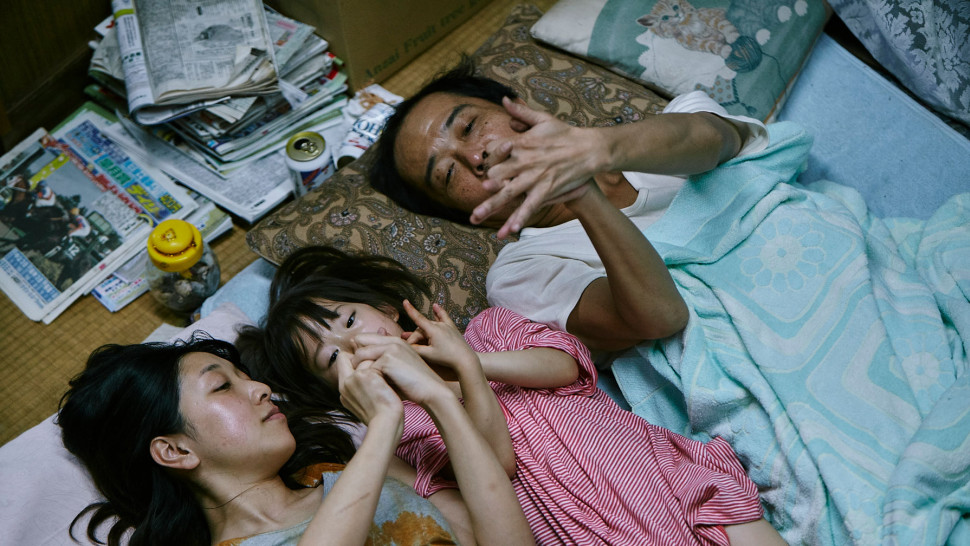Unhappy families
by Clare Bailey
Two memorable cinematic families framed 2018 – the Laurent family in Micheal Haneke’s Happy End showing in the UK at the beginning of the year, and the Shabatas in Hirokazu Kore-eda’s Shoplifters, released at the very end.
The families stand at opposite ends of the social scale – the wealthy Laurent dynasty owns a big construction company in Calais, the Shabatas live hand-to-mouth in cramped conditions in a poor quarter of Tokyo – and the two directors work in very different emotional tones. Yet they ask similar questions about what binds people together in family groups, what these groups are for, what assumptions we make when we talk about parent and child.
One of the early shots in Happy End is of the massive collapse of a concrete retaining wall in the foundations of a building under construction by the Laurent family. We see it bulging then buckling and crumbling, and then a great avalanche of earth and rubble. One of the construction workers is killed. For a film in which every human exchange is later seen to be about defending, exerting or extending power, the suggestion that things can collapse is something we keep in mind as we get to know this family and begin to understand what its priorities are.
Anne Laurent (played by Isabelle Huppert) is the hard-working vehicle for the transmission of power in the family. There’s no time or place for emotion; her face expresses no feeling except the occasional flicker of impatience when she has to sort out the latest mess her hopeless adult son Pierre has got into. Her father, Georges, who no longer has a role in the company and has nothing left to live for, passes on the family philosophy to his 12-year-old granddaughter Eve, Anne’s niece: toughen up, life’s hard, get used to it. Eve’s mother is dying in hospital at the time.
Haneke’s film records the myriad microscopic ways the bourgeois family prepares its members to survive and win. Human impulses that might compromise the defence of privilege are systematically cauterised, the weak are abandoned. It’s an anatomy of a loveless society. Eve expresses this most simply and clearly, speaking to her father when he visits her in hospital after she has taken an overdose. Dismissing his mumbled expression of concern, and asking him for one reassurance, that when he leaves his second wife he will take her with him so she doesn’t end up in a hostel, she says: “Don’t pretend you love me, I know you don’t. Not me, nor my mother nor Alex. You don’t love anyone.”
We see this lovelessness in action most memorably at Anne’s wedding to her second husband towards the end of the film when wayward, damaged son Pierre arrives late, bringing with him a group of migrants from the Jungle. Pierre doesn’t know Anne has written him out of the company structures as part of a deal her husband-to-be brokers with City financiers in London and thinks there’s still some sort of dialogue to be had with her, some sort of protest or reproach he can make that will have an impact or give him an identity.
Anne’s response when he begins to introduce the migrants to the wedding guests en masse is to go up to him smiling, whisper a command to him to shut up – and to break his finger. She’s willing to pay whatever the price is for the successful continuation of the company, including the ‘castration’ and sacrifice of her unhappy son. Pierre, it should be added, is happy enough to live in a flat she provides; he’s shackled to the family and its money and his protests are all symbolic. He is a brilliant portrait of what a society capable of long-distance bombing by drone – condemning displaced and traumatised people to a migrant life or tents in Calais if they make it that far – might call domestic collateral damage.
Kore-eda’s vision is less pitiless but ultimately no less forensic than Haneke’s. The Shabatas are a tightly knit family of five unable to make ends meet even though Osamu has a job on a construction site and Nobuyo works in a laundry; they are one piece of bad luck, one injury away from not managing at all and survive by shoplifting. What they steal is food, and family mealtimes feature prominently throughout the film. Eating together is what they do, when jokes are shared, arguments had, decisions made.
Early on, Osamu and 10-year-old Shota return from a shoplifting outing with Juri, a 5-year-old girl they find shivering alone in the dark on the balcony of a nearby flat. They feed her for a couple of days and then, when they’re returning her to where they found her, they overhear a terrible row going on inside about the missing child and a woman’s voice shouting she wishes she’d never had her. They decide to keep her. There are the marks of physical abuse all over Juri’s body.
Slowly, we begin to understand that relations between individuals in this family aren’t what they seem. The connections between them become more complicated and tenuous until we don’t know where we are – when the boy Shota refuses to call Osamu ‘dad’ we assume Nobuyo is his mother and Osamu his stepfather but we’re still wide of the mark. The couple – who are not married and are only together because Nobuyo employed Osamu to help her kill her abusive husband – found Shota abandoned and living by himself in a car.
What Kore-eda has created is a makeshift family, people bound together by circumstance and necessity. Survival is easier for each individual if they can combine to look like a family. And yet it’s clear from the moment Osamu and Shota bring Juri home with them that what has also survived in these conditions and against the odds is a human warmth that goes beyond pragmatic calculation and has been asphyxiated in the Laurent family.
Kore-eda is careful never to let this tip into sentimentality: the grandmother figure Hatsue soothes and heals various ills, physical and emotional, but also drives the others mad by cutting her toenails too close to the table and is a skilled extractor of money from her dead husband’s second family whom she visits regularly on the pretext of paying her respects to the dead. What we discover on one of these visits is that Aki, the young sex worker and the girl we have assumed is Nobuyo’s younger sister, is actually the missing daughter of this most conventional of nuclear families. They cover up her absence by pretending to Hatsue, who has just left Aki back at home, that she’s studying in Australia.
By the time Hatsue dies and Osamu and Nobuyo bury her under the kitchen floor so they can continue to draw her pension and not lose the house which is rented in her name, we’re on their side. Without passing judgment, we watch them dig the hole, hear them recall as they work how they’d done it before when they had to dispose of Nobuyo’s husband’s body; filming the scene in detail, Kore-eda evokes in us an implicated interest in the sheer physical difficulty of the task.
The things that are beautiful are few but they sustain something essential in the Shabatas’ shared life – Osamu’s undisguised delight after what seems to be an unusual event – sex with Nobuyo; Shota’s marble held up in torchlight in the tiny space he sleeps in; and most beautiful of all, a prolonged aerial shot of the upturned faces of the whole family peering out from under the eaves of the house to watch a firework display.
At the end, Shota, hoping for delivery from hardship and unable to bear the task of teaching Juri to steal, precipitates a crisis. A police hunt for the missing Juri tracks her down to the Shabatas’ house and arrests follow. The closing scenes are sombre. The police don’t recognize the group as a family; what they see are kidnappers, murderers, thieves, con-men, fraudsters on the wrong side of every law you can think of. Words like ‘mother’ and ‘father’ become weapons in their hands and the Shabatas’ shared life comes to an unhappy end. The final shot is of Juri, returned to her violent home and alone on the balcony again, peering over the top, perhaps looking for Shota.
Haneke’s film is a brilliant analysis of the cruelties and hypocrisies, the realpolitik and the theatre embedded in every familial exchange in a society dedicated solely to the preservation of property – a critique as passionate and vivid as those of the great analysts of the bourgeois family such as Honoré de Balzac and Angela Davis. Kore-eda looks at the same society from the perspective of those who own nothing and records instead a creative answer to dehumanisation, something both tough and gentle, a network muscular and canny enough to survive in a pitiless city – but also delicate, tactful, discreet. The Laurent family may own a construction company but the Shabatas are the real builders.

Happy End

Shoplifters






